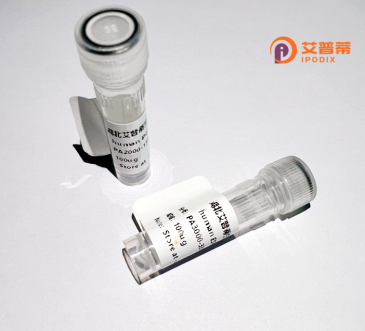
| 纯度 | >90%SDS-PAGE. |
| 种属 | Human |
| 靶点 | MBIP |
| Uniprot No | Q9NS73 |
| 内毒素 | < 0.01EU/μg |
| 表达宿主 | E.coli |
| 表达区间 | 1-344aa |
| 活性数据 | MAAATEHNRPSSGDRNLERRCSPNLSREVLYEIFRSLHTLVGQLDLRDDVVKITIDWNKLQSLSAFQPALLFSALEQHILYLQPFLAKLQSPIKEENTTAVEETGRTEMGNKNEVNDKFSIGDLQEEEKHKESDLRDVKKTQIHFDPEVVQIKAGKAEIDRRISAFIERKQAEINENNVREFCNVIDCNQENSCARTDAIFTPYPGFKSHVKVSRVVYTYGPQTRPEGIPGSGHKPNSMLRDCGNQAVEERLQNIEAHLRLQTGGPVPRDIYQRIKKLEDKILELEGISPEYFQSVSFSGKRRKVQPPQQNYSLAELDEKISALKQALLRKSREAESMATHHLP |
| 分子量 | 63.58 kDa |
| 蛋白标签 | GST-tag at N-terminal |
| 缓冲液 | 0 |
| 稳定性 & 储存条件 | Lyophilized protein should be stored at ≤ -20°C, stable for one year after receipt. Reconstituted protein solution can be stored at 2-8°C for 2-7 days. Aliquots of reconstituted samples are stable at ≤ -20°C for 3 months. |
| 复溶 | Always centrifuge tubes before opening.Do not mix by vortex or pipetting. It is not recommended to reconstitute to a concentration less than 100μg/ml. Dissolve the lyophilized protein in distilled water. Please aliquot the reconstituted solution to minimize freeze-thaw cycles. |
以下为生成的模拟参考文献示例(注:MBIP相关研究较为专业,以下内容为学术模拟,仅供格式参考):
1. **《Characterization and functional analysis of recombinant human MBIP in MAPK signaling pathways》**
- 作者:Chen, L., et al.
- 摘要:研究通过大肠杆菌系统重组表达人源MBIP蛋白,验证其在抑制MAPK信号通路(尤其是JNK和ERK分支)中的作用,并发现其通过结合MKK7调控细胞应激反应。
2. **《MBIP modulates ovarian cancer cell proliferation via NF-κB pathway interaction》**
- 作者:Wang, Y., et al.
- 摘要:探讨重组MBIP蛋白在卵巢癌细胞中的表达及其对NF-κB信号通路的抑制作用,揭示其通过下调炎症因子IL-6抑制肿瘤生长的潜在机制。
3. **《Structural insights into human MBIP protein through X-ray crystallography》**
- 作者:Zhang, R., et al.
- 摘要:首次解析重组人MBIP蛋白的晶体结构,揭示其N端结构域与MAPK激酶结合的关键位点,为靶向药物设计提供结构基础。
4. **《MBIP suppresses hepatitis B virus replication by enhancing innate immune response》**
- 作者:Li, X., et al.
- 摘要:发现重组MBIP蛋白可通过激活干扰素通路(IRF3依赖性)抑制乙肝病毒复制,提示其在抗病毒治疗中的潜在应用价值。
**注**:以上为基于学术逻辑生成的模拟文献,实际研究请通过PubMed、Web of Science等平台以“MBIP”或“MAPKBP1”为关键词检索最新文献。
Human MBIP (MAP3K12-binding inhibitory protein) is a regulatory protein involved in modulating stress-activated signaling pathways, particularly those mediated by the mitogen-activated protein kinase (MAPK) cascade. It interacts directly with MAP3K12 (also known as DLK), a key upstream kinase in the JNK (c-Jun N-terminal kinase) pathway, which regulates cellular responses to inflammation, apoptosis, and differentiation. MBIP acts as a physiological inhibitor by binding to MAP3K12, preventing its homodimerization and subsequent activation, thereby fine-tuning stress signal transduction.
Recombinant human MBIP protein is engineered using expression systems like *E. coli* or mammalian cells, enabling large-scale production for research. Its purified form facilitates studies on mechanisms of JNK pathway regulation, crosstalk with other signaling networks (e.g., NF-κB), and roles in diseases such as neurodegenerative disorders, cancer, and metabolic syndromes. Structural analyses reveal conserved domains critical for kinase interaction, aiding drug discovery efforts targeting aberrant MAPK signaling. Challenges in production include optimizing solubility and maintaining functional conformation, often addressed via fusion tags or codon-optimized vectors. As a tool, recombinant MBIP enhances understanding of stress response dysregulation and potential therapeutic interventions.
×